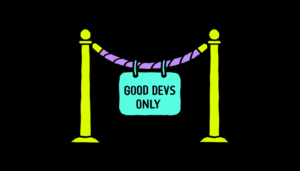You’ll find thousands of guides on technical mastery. What most miss is what truly separates good from great: web developer soft skills. After 2,000+ projects at Lemon.io, we’ve seen that tech chops alone rarely guarantee success. The devs clients remember—and rehire—aren’t just fluent in React or Python. They organize chaos, keep teams moving, and solve human problems as well as technical ones.
Nobody puts “empathy” or “initiative” on a resume and expects it to close a deal. But ask any team who’s shipped on time (or missed the mark) what made the difference, and they’ll point to those exact qualities. Communication. Self-management. Owning the tough moments. In short: the soft skills every web developer needs, but few talk about until it’s too late.
What’s behind these must-have traits? Real stories—moments where a conversation saved a launch, or silent friction sunk a sprint. Let’s dig into what you actually need to thrive in today’s dev world, and why Lemon.io doesn’t compromise when it comes to these skills.
Why Soft Skills Make (or Break) a Developer’s Impact
It’s easy to assume technical skills drive success. That’s only half the story. At Lemon.io, we’ve reviewed thousands of candidates who tick every hard skill box—algorithms, frameworks, years of experience. But we see the same pattern: projects fail or succeed because of soft skills, not technical genius.
Here’s the data: In our vetting process, more than half of candidates who clear the tech screen stumble on communication or self-management. They can code, but struggle to ask the right questions in a sprint. Or they freeze when a vague client request comes through.
One project lead summed it up after a troubled launch: “The code worked. The teamwork didn’t.” The bug wasn’t technical—it was a missed handoff, an unasked question, a message that landed too late.
On the flip side, our highest-rated developers do more than just deliver features. They calm tense meetings, clarify priorities, and give clients confidence, especially when things go sideways. That’s why, for us, soft skills aren’t a “bonus.” They’re what make a developer’s impact real and lasting.
The Web Developer Soft Skills Clients Should Value
If you’ve hired web developers before, you know clean code is only half the battle. The difference between a project that glides and one that stalls usually comes down to what isn’t listed in the job description.
Across thousands of Lemon.io matches, the developers clients keep coming back for all share a core set of behaviors:
- Communication: The dev who flags blockers early, delivers clear updates, and can break down technical challenges for non-technical teammates keeps projects on track and clients in the loop.
- Initiative: Clients notice those who step up before they’re asked—flagging a failing API at odd hours, or offering solutions before the problem snowballs. Waiting for instructions is a quick way to stall momentum.
- Self-Management: Managing your own deadlines, adjusting to shifting requirements, and shipping reliably—even when things change. Teams lean on the dev who can keep moving without hand-holding.
- Empathy: The ability to read the room, put yourself in a client’s shoes, and navigate tense moments with a bit of tact. These are the traits clients remember when deciding who to call back.
Across 2,000+ Lemon.io projects, the pattern holds: technical skill gets you in the door, but soft skills—especially communication, initiative, and empathy—turn you into the dev clients remember, trust, and rehire.
Red Flags: How to Spot Soft Skill Gaps Early
You can sense most trouble long before it blows up a sprint. At Lemon.io, the warning signs often appear before the first commit—or in the first week on the job. Each of these red flags reveals a missing web developer soft skill that technical know-how can’t cover up.
Silence When Things Get Hard
One developer ghosted a client mid-project. No responses, no updates. Only after days of silence did we finally reach him—turns out, he was dealing with a family emergency. The client, thankfully, was compassionate. But the radio silence created confusion and nearly broke trust.
A single, honest message would have made all the difference. If you can’t share details, at least let the team know you’re unavailable.
Not Speaking Up About Misalignments
We had a developer accept a project for a business model he wasn’t comfortable with. He didn’t mention his concerns, just cherry-picked tasks and delivered spotty results. Weeks later, he admitted he’d been uncomfortable from the start.
The client got an apology, but also lost time. The lesson: if you can’t fully buy in, say so up front. Teams can work around a “no”—they can’t work with hidden disengagement.
Professionalism Slips: Fridge-Worthy Feedback
After a client politely thanked a developer for handling a quick request outside of hours, the dev replied, “I can’t put your thank you on the fridge.” Technically, nothing went wrong. But the comment soured the relationship and left the client second-guessing future collaboration. Even small lapses in attitude can turn into big doubts.
Interview Impressions: What You Signal Before You Ship
First impressions matter—sometimes more than skill. We’ve seen developers show up to intro calls or interviews lying in bed, sitting in noisy cafes, or (in one notorious case) standing up on camera mid-call with no pants on.
Even if your code is solid, pulling these moves tells a client their project is just another errand, not a priority. Out-of-place humor or careless behavior (like swapping in a provocative profile picture) sends a message—one no technical ability can redeem.
Spotting these behaviors early lets you address gaps directly, before they escalate. After 2,000+ projects, we know these aren’t personality quirks—they’re dealbreakers that predict trouble, lost trust, or even an abrupt end to the working relationship.
How Lemon.io Vets for Web Developer Soft Skills
Most platforms just test code. We look for something rarer—and riskier to miss.
Every candidate who clears our technical bar enters a second stage: real, unscripted conversations.
What We’re Looking For
- Communication Clarity: Can you explain technical choices so anyone can understand? For example, when we ask candidates to walk us through a tricky migration, the best ones break it down in simple terms—no jargon, no ego. If you can’t make sense to non-engineers, clients will struggle to trust you with big decisions.
- Handling the Unknown: What happens when you don’t know? Do you freeze, or ask for help? We intentionally ask off-script questions. The top devs admit what they don’t know, ask for more detail, or show how they’d find an answer. Process matters more than perfection here.
- Openness to Feedback: When challenged, do you listen—or get defensive? We offer gentle pushback and watch the response. Those who get curious or revise their answer—rather than doubling down or dismissing the question—stand out for the right reasons.
- Self-Management: Can you organize your time and flag shifting requirements early? We ask about surprises on past projects. Candidates who set new priorities and keep teams updated earn high marks. If someone shrugs or blames chaos, we know they’ll struggle in the real world.
- Professionalism: Do you show up on time, prepared, and treat client calls (and interviews) seriously? Attitude shows up in the little things—joining a call from bed, ignoring a noisy environment, or acting as if the interview is a formality. These are signs of how you’ll treat real projects.
How We Spot It
Instead of just ticking boxes, we dig deeper:
- Challenge candidates to walk us through setbacks, not just successes.
- Listen for blame-shifting or dodging tough questions—a hard stop.
- Pay close attention to first impressions. Bedhead, noisy coffee shops, or half-hearted effort signal potential client risks.
The Results
More than half of technically strong candidates don’t pass our soft skills test. Those who do? They’re rehired, trusted, and leave teams better off.
If you’re looking for shortcuts, this isn’t the place. But if you bring initiative, clear updates, and a focus beyond code, you’ll stand out—and get called back.
How to Test for Web Developer Soft Skills
You can’t spot soft skills with a coding quiz. They show up in context, under mild stress, and in the little interactions most teams overlook. Here’s how to actually test for them—before you commit to a hire.
Soft Skill |
How to Test for It During Hiring |
What to Look For |
|---|---|---|
Communication |
Ask candidates to recap a tricky technical change to a non-technical stakeholder. Request frequent, informal updates during a trial project. |
Look for clarity, conciseness, and a habit of flagging issues before they escalate. |
Feedback Openness |
Offer gentle pushback on one of their ideas; ask how they handle negative feedback. |
Do they listen and adapt, or get defensive? Can they explain what they’d do differently next time? |
Initiative |
Present a vague spec or an “unfixable” bug and withhold extra detail. |
Do they ask smart questions, propose options, or freeze up? Are they comfortable navigating ambiguity? |
Empathy |
Change requirements mid-discussion. Ask how changes affect users, clients, or the team. |
Listen for thoughtful questions, concern for impact, and the ability to see beyond code. |
Self-Management |
Ask about a time when priorities shifted suddenly. Set a tight mini-project and see how they organize and report progress. |
You want proactive check-ins, structure, and evidence of adapting without drama. |
Most hiring teams focus on hard skills. But if you want projects to finish on time (with fewer headaches), testing for web developer soft skills up front is what pays off.
Ready to Level Up? What Happens When You Hire for Soft Skills
Think back to the best developer you’ve worked with. Odds are, it wasn’t just the code—they made your life easier. You got clear updates before you had to ask. You saw risks flagged while there was still time to act. When things changed (as they always do), they adapted, kept you informed, and just got on with it.
That’s not luck; it’s a set of habits you can actually hire for. The difference isn’t about finding a unicorn, or rolling the dice—it’s about choosing people who practice the basics, show up when it matters, and make your job less stressful.
If you want devs who bring that level of ownership—without the drama—you know where to start. Hire here.









